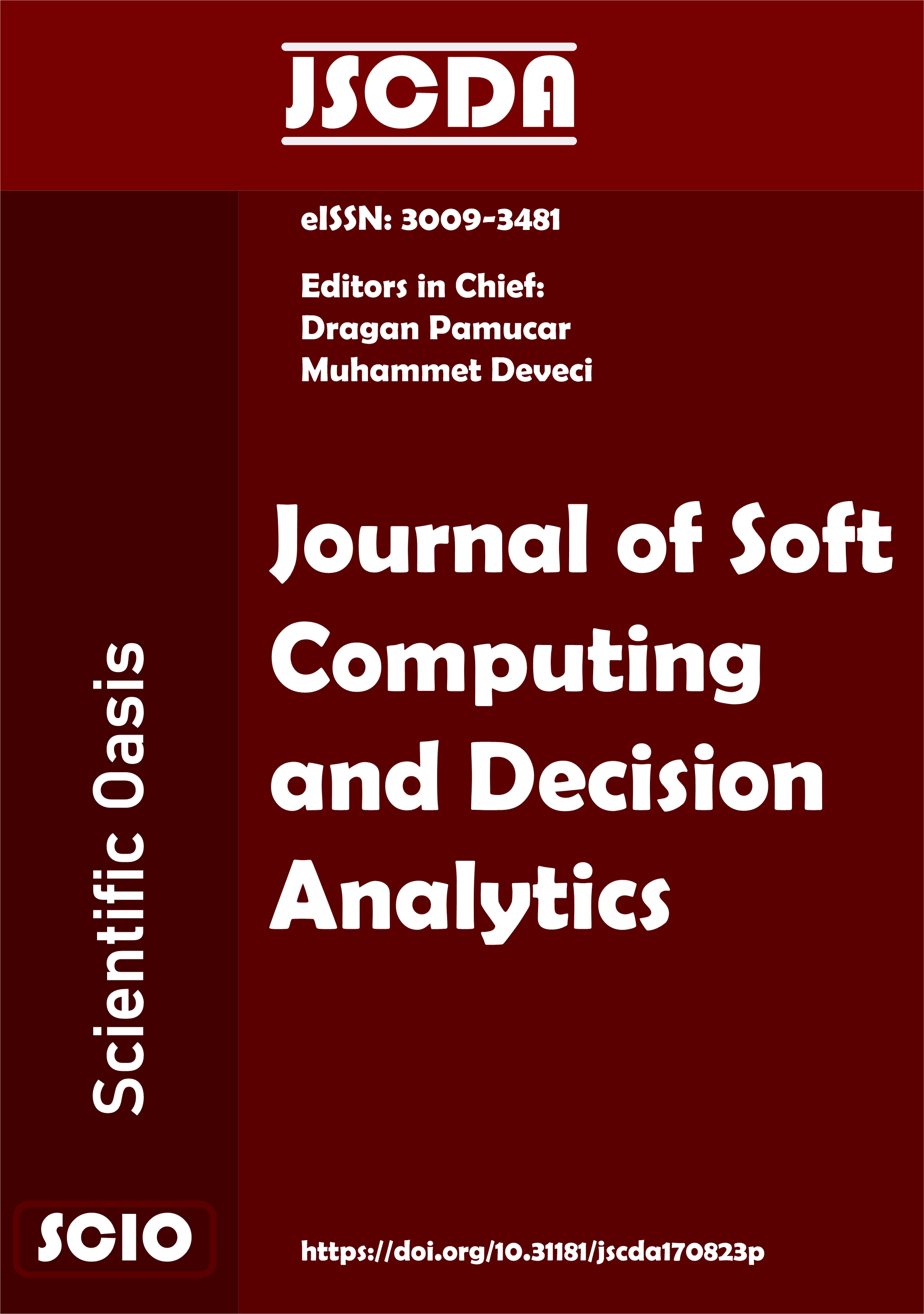Identifying the Right Policies for Increasing the Efficiency of the Renewable Energy Transition with a Novel Fuzzy Decision-Making Model
DOI:
https://doi.org/10.31181/jscda1120234Keywords:
Renewable energy, energy transition, fuzzy logic, decision-making modelsAbstract
Necessary improvements should be made to the determinants of renewable energy transition. However, it is necessary to give priority to the issues that are more important while making improvements to this process since all improvements cause cost increase. Therefore, a new analysis is needed in which the most important ones among these criteria will be determined. The purpose of this study is to identify the most essential items for renewable energy transition. Within this context, five criteria are selected based on the literature review results. Spherical fuzzy (TOPSIS-based DEMATEL) TOP-DEMATEL methodology is taken into consideration to calculate the weights of these indicators. In the second part of the study, alternatives are ranked with Spherical fuzzy ranking technique by geometric mean of similarity ratio to optimal solution (RATGOS). In this context, BRICS countries (Brazil, Russia, India, China, South Africa) are selected as alternatives. The main contribution is that a new method (RATGOS) is created while considering geometric mean in proportional concepts. On the other side, a new methodology (TOP-DEMATEL) is also proposed to overcome criticisms in DEMATEL. It is concluded that technological development plays the most important role for the success of renewable energy transition. Similarly, finding effective financial source is also very important in this condition. The ranking results also demonstrate that China and Russia are the most successful countries regarding renewable energy transition. However, it is also defined that South Africa and India are less successful in renewable energy transition in comparing with other BRICS countries. It is understood that technological development plays a critical role in increasing the efficiency of the renewable energy transition process. Thanks to the use of up-to-date technology, it is possible to use energy resources more efficiently. Technological developments are also necessary for the efficiency of energy storage processes. Variations in climatic conditions cause irregularities in the energy production process. Thanks to the efficient energy storage processes, it is possible to solve this problem.
References
Wang, J., Shahbaz, M., Dong, K., & Dong, X. (2023). Renewable energy transition in global carbon mitigation: Does the use of metallic minerals matter?. Renewable and Sustainable Energy Reviews, 181, 113320. https://doi.org/10.1016/j.rser.2023.113320
Sun, Y., Gao, P., & Razzaq, A. (2023). How does fiscal decentralization lead to renewable energy transition and a sustainable environment? Evidence from highly decentralized economies. Renewable Energy, 206, 1064-1074. https://doi.org/10.1016/j.renene.2023.02.069
Alshamrani, A., Majumder, P., Das, A., Hezam, I. M., & Božanić, D. (2023). An integrated BWM-TOPSIS-I approach to determine the ranking of alternatives and application of sustainability analysis of renewable energy. Axioms, 12(2), 159. https://doi.org/10.3390/axioms12020159
Eti, S., Dinçer, H., Yüksel, S., & Gökalp, Y. (2022). Analysis of the suitability of the solar panels for hospitals: A new fuzzy decision-making model proposal with the T-spherical TOP-DEMATEL method. Journal of Intelligent & Fuzzy Systems, (Preprint), 1-13. https://doi.org/10.3233/JIFS-222968
Xin-Gang, Z., & Ying, Z. (2023). Can China’s renewable energy industry policy support the low-carbon energy transition effectively?. Environmental Science and Pollution Research, 30(11), 29525-29549. https://doi.org/10.1007/s11356-022-24324-7
Liu, W., Shen, Y., & Razzaq, A. (2023). How renewable energy investment, environmental regulations, and financial development derive renewable energy transition: Evidence from G7 countries. Renewable Energy, 206, 1188-1197. https://doi.org/10.1016/j.renene.2023.02.017
Du, J., Shen, Z., Song, M., & Vardanyan, M. (2023). The role of green financing in facilitating renewable energy transition in China: Perspectives from energy governance, environmental regulation, and market reforms. Energy Economics, 120, 106595. https://doi.org/10.1016/j.eneco.2023.106595
Wang, B., Wang, J., Dong, K., & Dong, X. (2023). Is the digital economy conducive to the development of renewable energy in Asia?. Energy Policy, 173, 113381. https://doi.org/10.1016/j.enpol.2022.113381
Balcilar, M., Usman, O., & Ike, G. N. (2023). Operational behaviours of multinational corporations, renewable energy transition, and environmental sustainability in Africa: Does the level of natural resource rents matter?. Resources Policy, 81, 103344. https://doi.org/10.1016/j.resourpol.2023.103344
Murshed, M. (2023). Efficacies of technological progress and renewable energy transition in amplifying national electrification rates: contextual evidence from developing countries. Utilities Policy, 81, 101512. https://doi.org/10.1016/j.jup.2023.101512
Chen, J., Luo, Q., Tu, Y., Ren, X., & Naderi, N. (2023). Renewable energy transition and metal consumption: Dynamic evolution analysis based on transnational data. Resources Policy, 85, 104037. https://doi.org/10.1016/j.resourpol.2023.104037
Irfan, M., Rehman, M. A., Razzaq, A., & Hao, Y. (2023). What derives renewable energy transition in G-7 and E-7 countries? The role of financial development and mineral markets. Energy Economics, 121, 106661. https://doi.org/10.1016/j.eneco.2023.106661
Abbas, S., Saqib, N., & Shahzad, U. (2023). Global export flow of Chilean copper: The role of environmental innovation and renewable energy transition. Geoscience Frontiers, 101697. https://doi.org/10.1016/j.gsf.2023.101697
Bai, W., Zhang, L., Lu, S., Ren, J., & Zhou, Z. (2023). Sustainable energy transition in Southeast Asia: Energy status analysis, comprehensive evaluation and influential factor identification. Energy, 128670. https://doi.org/10.1016/j.energy.2023.128670
Chetty, K., Davids, Y. D., Kanyane, M., Madzivhandila, T., Moosa, T., & Ndaba, L. (2023). Fostering a just energy transition: Lessons from South Africa's Renewable Energy Independent Power Producer Procurement Programme. South African Journal of International Affairs, 1-20. https://doi.org/10.1080/10220461.2023.2229293
Sillak, S. (2023). All talk, and (no) action? Collaborative implementation of the renewable energy transition in two frontrunner municipalities in Denmark. Energy Strategy Reviews, 45, 101051. https://doi.org/10.1016/j.esr.2023.101051
Hwang, Y. K. (2023). The synergy effect through combination of the digital economy and transition to renewable energy on green economic growth: Empirical study of 18 Latin American and caribbean countries. Journal of Cleaner Production, 418, 138146. https://doi.org/10.1016/j.jclepro.2023.138146
Ahmad, M., Dai, J., Mehmood, U., & Abou Houran, M. (2023). Renewable energy transition, resource richness, economic growth, and environmental quality: Assessing the role of financial globalization. Renewable Energy, 216, 119000. https://doi.org/10.1016/j.renene.2023.119000
Zeraibi, A., Jahanger, A., Adebayo, T. S., Ramzan, M., & Yu, Y. (2023). Greenfield investments, economic complexity, and financial inclusion-environmental quality nexus in BRICS Countries: Does renewable energy transition matter?. Gondwana Research, 117, 139-154. https://doi.org/10.1016/j.gr.2022.12.020
Bhattarai, U., Maraseni, T., Apan, A., & Devkota, L. P. (2023). Rationalizing donations and subsidies: Energy ecosystem development for sustainable renewable energy transition in Nepal. Energy Policy, 177, 113570. https://doi.org/10.1016/j.enpol.2023.113570
Siddik, A. B., Khan, S., Khan, U., Yong, L., & Murshed, M. (2023). The role of renewable energy finance in achieving low-carbon growth: contextual evidence from leading renewable energy-investing countries. Energy, 270, 126864. https://doi.org/10.1016/j.energy.2023.126864
Chen, J., Huang, S., & Kamran, H. W. (2023). Empowering sustainability practices through energy transition for sustainable development goal 7: The role of energy patents and natural resources among European Union economies through advanced panel. Energy Policy, 176, 113499. https://doi.org/10.1016/j.enpol.2023.113499
Özdemirci, F., Yüksel, S., Dinçer, H., & Eti, S. (2023). An assessment of alternative social banking systems using T-Spherical fuzzy TOP-DEMATEL approach. Decision Analytics Journal, 100184. https://doi.org/10.1016/j.dajour.2023.100184
Dınçer, H., Etı, S., Aksoy, T., Yüksel, S., Hacioglu, U., Mikhaylov, A., & Muyeen, S. M. (2023). Analysis of environmental impact for material production investments using a novel soft computing methodology. IEEE Access. https://doi.org/10.1109/ACCESS.2023.3266524
Dincer, H., Eti, S., Yuksel, S., Gokalp, Y., & Celebi, B. (2022). Strategy Generation for Risk Minimization of Renewable Energy Technology Investments in Hospitals with SF TOP-DEMATEL Methodology. Journal of Computational and Cognitive Engineering. https://doi.org/10.47852/bonviewJCCE32021141
Dinçer, H., Eti, S., Yüksel, S., Özdemir, S., Yílmaz, A. E., & Ergün, E. Integrating data mining and fuzzy decision-making techniques for analyzing the key minimizing factors of carbon emissions. Journal of Intelligent & Fuzzy Systems, (Preprint), 1-17. https://doi.org/10.3233/JIFS-232303
Afshan, S., Ozturk, I., & Yaqoob, T. (2022). Facilitating renewable energy transition, ecological innovations and stringent environmental policies to improve ecological sustainability: evidence from MM-QR method. Renewable Energy, 196, 151-160. https://doi.org/10.1016/j.renene.2022.06.125
Wang, S., Sun, L., & Iqbal, S. (2022). Green financing role on renewable energy dependence and energy transition in E7 economies. Renewable Energy, 200, 1561-1572. https://doi.org/10.1016/j.renene.2022.10.067
Bouyghrissi, S., Murshed, M., Jindal, A., Berjaoui, A., Mahmood, H., & Khanniba, M. (2022). The importance of facilitating renewable energy transition for abating CO2 emissions in Morocco. Environmental Science and Pollution Research, 29(14), 20752-20767. https://doi.org/10.1007/s11356-021-17179-x
Chan, H. W., Udall, A. M., & Tam, K. P. (2022). Effects of perceived social norms on support for renewable energy transition: Moderation by national culture and environmental risks. Journal of Environmental Psychology, 79, 101750. https://doi.org/10.1016/j.jenvp.2021.101750
Downloads
Published
Issue
Section
License
Copyright (c) 2023 Scientific Oasis

This work is licensed under a Creative Commons Attribution-NonCommercial-NoDerivatives 4.0 International License.
















